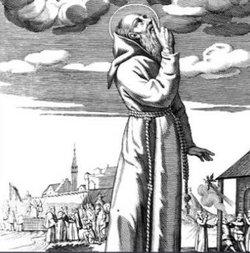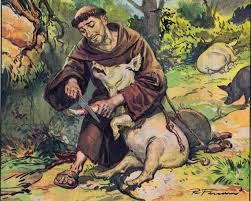
Juniper is an evergreen plant common in many parts of Italy, known for its beauty and resistance. In the Christian tradition, it is particularly associated with St. Francis of Assisi, who wrote a famous hymn to Friar Juniper, celebrating his humility and fidelity to the earth.
St. Francis, also called the "Poverello of Assisi", was a thirteenth-century Italian religious and saint, founder of the Order of Friars Minor, known for his deep devotion to nature and simplicity. He regarded all creatures as brothers and sisters, and saw in every living thing a reflection of divinity.
The juniper, with its ability to thrive in arid and harsh environments, was seen by St. Francis as a symbol of faith and perseverance. In the hymn "Canticle of the Creatures", St. Francis celebrates the juniper, calling it "Brother Juniper", and describes it as "humble and strong, evergreen and faithful, which adapts to the most difficult conditions".
Juniper has also been used in folk medicine to treat various ailments, from rheumatic pains to coughs, and its twigs have been used to make brooms and baskets. St. Francis also used his twigs to make his famous twig cross, which he always carried with him as a symbol of his faith and his devotion to nature.
Furthermore, St. Francis used to use nature to speak about spiritual truths, and the juniper was no exception. In his sermons, he often used juniper as a metaphor for faith, emphasizing how it thrives in difficult conditions and remains evergreen, just as faith should always be alive and active in the hearts of men.
In summary, the juniper and San Francesco have a deep bond in history and tradition. The juniper was seen as a symbol of faith and perseverance by St. Francis, who celebrated it in the hymn "Canticle of the Creatures" and used it as a metaphor for faith in his sermons. This relationship continues to be celebrated today, with many churches and shrines in Italy honoring St. Francis and the juniper together.
Another decisive curiosity, which is the one that has always fascinated me the most, is that of the relationship between St. Francis of Assisi and Fra Ginepro or Friar Ginepro, the person about whom St. Francis wrote a very significant phrase and which expresses very well the relationship I had with the friar and with this incredible plant.

friar juniper and his holy madness
The phrase "Would God wish that I had a whole forest of such junipers" is a quote taken from the hymn "Canticle of the Creatures" written by St. Francis of Assisi. In this hymn, St. Francis celebrates the creatures of nature, thanking God for each of them and praising their qualities.
In this specific quote, St. Francis expresses his desire to have a large quantity of junipers, which he called "Brother Juniper", in his life. He sees in this evergreen plant a symbol of faith and perseverance, and wishes to have many around him because they remind him of these qualities.
The phrase can be interpreted as a desire by St. Francis to have a great deal of faith and perseverance in his life, and to surround himself with things that remind him of these qualities. Furthermore, it can be seen as a way for St. Francis to thank God for the beauty and faithfulness of nature, and to ask that he may always have a great deal of these things in his life.
In summary, the phrase "Would God wish that I had a whole forest of such junipers" is a quotation from the hymn "Canticle of the Creatures" written by St. Francis of Assisi, in which he expresses his desire to have a large quantity of junipers around him, because they remind him of faith and perseverance. This sentence can be interpreted as a way for St. Francis to thank God for the beauty and fidelity of nature and to ask to always have these qualities in his life.







